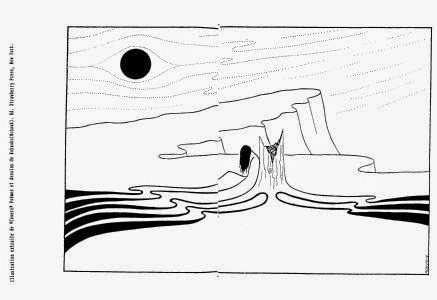Reading what I have just written, I now believe
I stopped precipitously, so that my story seems to have been
slightly distorted, ending, as it did, not abruptly
but in a kind of artificial mist of the sort
sprayed onto stages to allow for difficult set changes.
Why did I stop? Did some instinct
discern a shape, the artist in me
intervening to stop traffic, as it were?
A shape. Or fate, as the poets say,
intuited in those few long ago hours—
I must have thought so once.
And yet I dislike the term
which seems to me a crutch, a phase,
the adolescence of the mind, perhaps—
Still, it was a term I used myself,
frequently to explain my failures.
Fate, destiny, whose designs and warnings
now seem to me simply
local symmetries, metonymic
baubles within immense confusion—
Chaos was what I saw.
My brush froze—I could not paint it.
Darkness, silence: that was the feeling.
What did we call it then?
A “crisis of vision” corresponding, I believed,
to the tree that confronted my parents,
but whereas they were forced
forward into the obstacle,
I retreated or fled—
Mist covered the stage (my life).
Characters came and went, costumes were changed,
my brush hand moved side to side
far from the canvas,
side to side, like a windshield wiper.
Surely this was the desert, the dark night.
(In reality, a crowded street in London,
the tourists waving their colored maps.)
One speaks a word: I.
Out of this stream
the great forms—
I took a deep breath. And it came to me
the person who drew that breath
was not the person in my story, his childish hand
confidently wielding the crayon—
Had I been that person? A child but also
an explorer to whom the path is suddenly clear, for whom
the vegetation parts—
And beyond, no longer screened from view, that exalted
solitude Kant perhaps experienced
on his way to the bridges—
(We share a birthday.)
Outside, the festive streets
were strung, in late January, with exhausted Christmas lights.
A woman leaned against her lover’s shoulder
singing Jacques Brel in her thin soprano—
Bravo! the door is shut.
Now nothing escapes, nothing enters—
I hadn’t moved. I felt the desert
stretching ahead, stretching (it now seems)
on all sides, shifting as I speak,
so that I was constantly
face to face with blankness, that
stepchild of the sublime,
which, it turns out,
has been both my subject and my medium.
What would my twin have said, had my thoughts
reached him?
Perhaps he would have said
in my case there was no obstacle (for the sake of argument)
after which I would have been
referred to religion, the cemetery where
questions of faith are answered.
The mist had cleared. The empty canvases
were turned inward against the wall.
The little cat is dead (so the song went).
Shall I be raised from death, the spirit asks.
And the sun says yes.
And the desert answers
your voice is sand scattered in wind.

